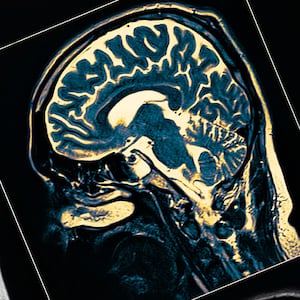There are currently no FDA-approved means to prevent or cure Parkinson’s—a disease that afflicts more than 10 million adults worldwide, and is expected to rise to 1.2 million by 2030. Patients usually start to show symptoms around age 50, and are prescribed the drug L-Dopa to alleviate some symptoms like tremors or involuntary body movements. Unfortunately it doesn’t slow down or stop the progression of Parkinson’s.
We may soon have a better form of treatment on the way. In a study published Wednesday in the journal Science Translational Medicine, researchers at San Francisco-based Denali Therapeutics developed a drug called DNL201 that targets LRRK2, a protein that is commonly mutated in Parkison’s and ends up killing brain cells. DNL201 stamped out the rogue protein’s presence in lab mice suffering from Parkinson’s, and was also shown to be safe in a Phase 1 clinical trial in 150 people (which included both healthy individuals as well as those with Parkinson’s). Should future clinical trials prove successful as well, this new drug could be a powerful new intervention against a growing health crisis.
Parkinson’s arises due to the destruction of neurons that produce dopamine, best known as the “feel-good” chemical that’s associated with pleasure and reward but is also crucial for motor function. Scientists estimate that 85 percent or more of all cases are caused by complex interactions between environmental and common genetic risk factors.
ADVERTISEMENT
One of the genes that seem to play a role governs the production of LRRK2. Mutated versions of the gene encourage inflammation that kills dopamine-making neurons.
Early genetic and animal studies conducted by scientists in Germany, the U.K., and by biotechnology company Genetech in the mid-2010’s showed a way to target LRRK2 with small molecule drugs that can more easily enter our cells.
Enter: DNL201. In previous studies on lab rats and macaque monkeys, the drug helped safely lower LRRK2 levels in the brain. Denali Therapeutics moved forward with a pair of human trials, administering DNL201 as a pill. Just as in the animal studies, the drug significantly reduced blood levels of LRRK while causing no adverse reactions.
In the second trial in particular, DNL201 was given to 28 patients with mild to moderate Parkinson’s disease, some of whom carried the LRRK2 gene mutation. Again, DNL201 lowered levels of LRRK2 without significant adverse reactions, except for those who got the higher dose of the drug (though the most severe complaint for those participants was a headache).
While these initial results are a promising start, the researchers caution that the study’s findings aren’t enough to guarantee DNL201 can treat Parkinson’s. It boils down to whether the drop in LRRK2 does correlate with saving dopamine-producing neurons from chemical destruction in humans as it did in the cell studies. To test that, DNL201 needs to be closely watched in much larger studies and for longer periods of time than simply one year, the researchers emphasize.
In the meantime, Denali Therapeutics is focusing on another LRRK2 blocker developed in tandem to DNL201, called DNL151. This drug was also found to be pretty effective at paring down LRRK2 and may be more convenient for patients since they need to take it only once a day, Laura Hansen, a spokesperson for Denali Therapeutics, told The Daily Beast in an email. There’s one clinical trial underway testing DNL151 in people with early-stage Parkinson’s disease. Another clinical trial for Parkinson’s patients who carry the LRRK2 mutation is expected for later this year.







